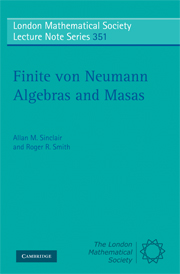Book contents
- Frontmatter
- Contents
- Preface
- 1 General introduction
- 2 Masas in B(H)
- 3 Finite von Neumann algebras
- 4 The basic construction
- 5 Projections and partial isometries
- 6 Normalisers, orthogonality and distances
- 7 The Pukánszky invariant
- 8 Operators in L∞[0, 1]⊗B(H)
- 9 Perturbations
- 10 General perturbations
- 11 Singular masas
- 12 Existence of special masas
- 13 Irreducible hyperfinite subfactors
- 14 Maximal injective subalgebras
- 15 Masas in non-separable factors
- 16 Singly generated II1 factors
- A The ultrapower and property Γ
- B Unbounded operators
- C The trace revisited
- Bibliography
- Index
- Index of symbols
3 - Finite von Neumann algebras
Published online by Cambridge University Press: 03 May 2010
- Frontmatter
- Contents
- Preface
- 1 General introduction
- 2 Masas in B(H)
- 3 Finite von Neumann algebras
- 4 The basic construction
- 5 Projections and partial isometries
- 6 Normalisers, orthogonality and distances
- 7 The Pukánszky invariant
- 8 Operators in L∞[0, 1]⊗B(H)
- 9 Perturbations
- 10 General perturbations
- 11 Singular masas
- 12 Existence of special masas
- 13 Irreducible hyperfinite subfactors
- 14 Maximal injective subalgebras
- 15 Masas in non-separable factors
- 16 Singly generated II1 factors
- A The ultrapower and property Γ
- B Unbounded operators
- C The trace revisited
- Bibliography
- Index
- Index of symbols
Summary
Introduction
This chapter is concerned with the basic theory of finite von Neumann algebras, with an emphasis on those which arise from discrete groups. This is described in Section 3.2, with the objective of reaching quickly the examples of masas which we present in Section 3.3. These are based on the work of Dixmier, [47], who found algebraic conditions on an abelian subgroup H of a discrete group G which are sufficient to imply that L(H) is a masa in the group von Neumann algebra L(G), and to determine the type of this masa. We present various matrix groups which satisfy these conditions and thus obtain examples of singular, Cartan and semi-regular masas.
Section 3.4 discusses various other ways in which naturally occurring masas can arise. These are based on tensor products and crossed products, and we give a detailed construction of a crossed product with two natural Cartan masas. We also give a brief discussion of free products in which examples of semi-regular masas are easy to exhibit. In Section 3.5 we prove that all difiuse separable abelian von Neumann algebras with a faithful normal trace are ✻-isomorphic to L∞[0, 1]. In particular this applies to masas.
Section 3.6 of the chapter returns to the basic theory of general finite von Neumann algebras, and we construct the unique trace preserving conditional expectation onto a subalgebra, which is fundamental throughout these notes.
- Type
- Chapter
- Information
- Finite von Neumann Algebras and Masas , pp. 17 - 51Publisher: Cambridge University PressPrint publication year: 2008



